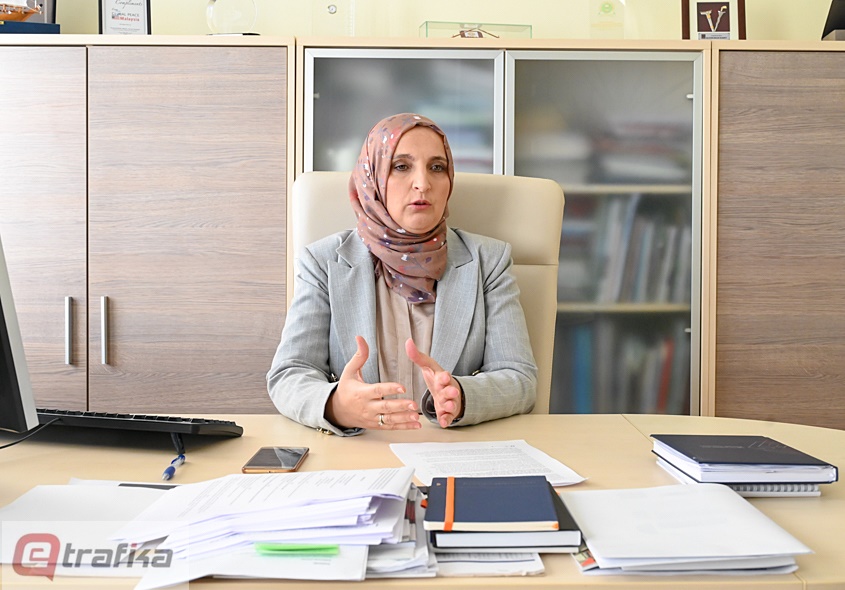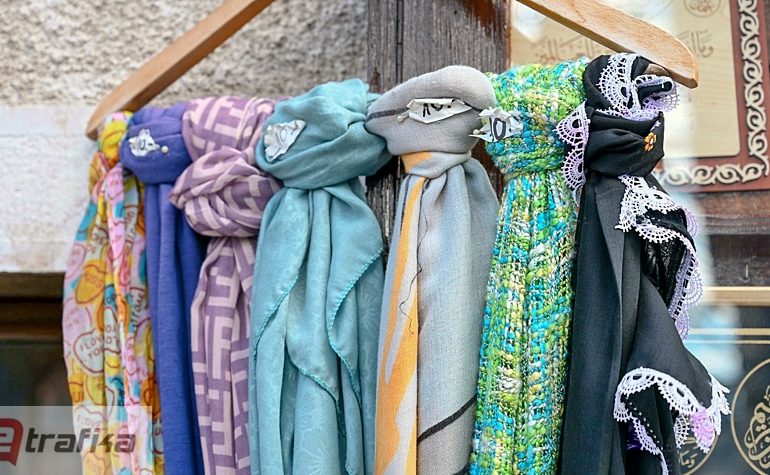„For me, my hijab is a reminder of our dear God, my educator, something I could not imagine my life without. Something pure, something holy, something helping me to get closer to Him. Few times, in communication with certain people, I felt as if they had perceived my hijab as a wall that they did not want to look through to see who I, as a persons, really was. I was often deprived of the possibility to introduce myself, to present my dreams, hopes, to tell a joke, to talk about my interests… Because of this, it is sometimes, but not always, more difficult for headscarved women to succeed in the same business in comparison to those women not being headscarved, given that our society uses hijab as the prism through which a woman is being observed“.
Written by: Vanja Stokic; Photo and video: Ajdin Kamber
This is how Edina Lokvancic, an English teacher, starts her interview with eTrafika. As a result of her decision to cover her hair, she is now facing various unpleasant reactions by the society. She highlights that during a high school field trip to Brcko, she was asked to leave the swimming pool because she wore burkini. She was told that she could not get into the swimming pool fully dressed, although she actually wore a swimsuit.
„On the other hand, there is an extreme situation where headscarved women are perceived as persons who, because of the hijab, are not allowed to make a single mistake. Due to wearing hijab, we are often labelled as being different from others, even from those practicing religion, and if it happens that we make a mistake, do something that is, according to someone’s personal opinion, considered as religiously inappropriate, then we hear unpleasant comments such as: „You, who are bulla! You don’t deserve to wear that cloth on your head!“ And if I pass two beggars, and give them money, but I have no change left to give to the third beggar, there will be comments like: „You, who are bulla!” There are other people who just pass the beggars, but nobody shouts after them „You, who are Muslim/Catholic/Orthodox!”, Edina says.
Headscarved women are expected to be quiet and humble, by no means sharp-tongued. In addition, the BiH society generally blames them for increasing national tensions.
„It is a very frustrating situation and the feeling we often have is that we are failing to break these barriers, which have been present for many years, and this wears us down a bit. It wears us down that we constantly have to prove ourselves for something that should be normal. Our acts and qualities should speak more than our appearance. However, the fact is that our identity, which is very visible, strongly affects people around us, so the first reaction by some is that they immediately put up the wall between us, especially if they have no earlier experience with headscarved women“, Sehija Dedovic from the Centre for Education and Research „Nahla“ says.
She has been wearing hijab for more than 30 years. It was and still is her expression of servitude to God. She says that she would like to clearly utter hear fears and attitudes to the other side, to those who have certain prejudice towards headscarved women, so that they could see all the problems she is facing. And then to resolve these problems.
„I am getting an impression that these people have a perception as if there was something behind my hijab, something that is a part of a larger agenda, that someone is forcing us to do this, conditioning us, or that we are privileged because of this. The real situation is quite different. I personally do not know anybody who has gained any privileges based on a hijab. To be fully open and honest, we mostly get discriminated against because of it. It happens very often that we are actually discriminated against by those who claim they are Muslims. Therefore, the fact that someone might mistreat us, have prejudice and stereotypes against us has little to do with his religious or ethnic background, but with that person’s earlier experience“, she adds.

She appeals to the acceptance of women who decide to wear hijab, but also of those who wish to take it off.
„As hard as it for me to see how difficult it is for some people in my community to accept a woman’s choice to wear a headscarf, it is equally hard to hear about the cases where the community or a social context or even tradition in some societies orders women to wear a hijab. And those who decide not to wear it always face a sort of rejection or condemnation, perhaps similar to the one we experience here when we put it on. For me, these two parallels, these two problems are equally difficult and I would equally fight against both“, she highlights.
The Master in Religious Studies, Djermana Kuric explains that headscarved women are mostly criticised for disobedience. Deviation from the stereotyped image of a woman as to how she should look like and how she should behave.
„This happens both among Muslims and non-Muslims. Among Muslims, there is a stereotyped image of a woman. And regardless of whether she is not headscarved or is headscarved, but does not wear her hijab in the way someone expects her to do, she will always be criticised this way or another. So, this is a very complex issue“, she explains.

There are several stereotypes associated with a woman’s decision to wear a headscarf. The first one is about these women being too traditional. If we do think of it in this way, then the same stereotype could apply to women who are not wearing a hijab, because they should automatically be labelled as being fashionable.
„The second stereotype is that this is an oppressed woman, because the hijab symbolises oppression. The third one is that hijab implies a certain kind of threat, and this is a more recent stereotype. The safety related threat, demographic, political social and other threats. And these are basically three main stereotypes dominant in our society, but there are also other. These stereotypes are deeply contextualised, and here, in our society, there might be certain types of stereotypes, in other societies there will be some other types, and their mutual relationship is different. There is certain undermining, reducing women down to her clothes only, or wearing certain type of clothes. This is not a new phenomenon, we have spotted this in the feminist studies, that an act of reducing a woman down to her clothes is used as an instrument to discipline a woman, to control her, and this is a general approach to women”, Djermana Kuric says.

Because of all this, women wearing hijab are disadvantaged as they have to work harder and make more effort in order to be equal to women not being headscarved in the eyes of people around them.
„The problem with such an attitude is that this is becoming a norm that someone needs to work twice as hard than others in order to be accepted as a complete person, as a capable human being. Therefore, this implies that there is a racist attitude of those who decide to accept such a norm”, she warns.
She sees her way of dressing as one of the elements on her path to experiencing God. Something that has grown with her and has changed, which she has perceived differently throughout different periods of her life. The decision to wear a hijab has changed her position in the society and has enabled her to see different perspectives.
„Hijab opened my eyes to the world I live in. It put me under a short test of, so to call it, humanity. Test in the sense of understanding other people, understanding their reaction towards me. Understanding openness of others and their humanity in relation to hijab I wear. Someone likes me for wearing hijab, and only because I wear hijab, whereas someone else dislikes me for that“, she explains, adding that none of these two extremes is acceptable for her. She does not want to be liked or disliked just because of her hijab.

Feminist circles often advocate for the liberation of headscarved women, but have not first inquired whether these women have put on the headscarf voluntarily or have been compelled to do so, and whether they feel trapped because of this. The question is to what extent such an attitude of feminists harms headscarved women, given that it has put them in a subordinate position and has additionally encouraged the stigma which is dominant in our society?
„Muslim women are disproportionally required to justify their choice to do or not to do something. Other women are not required to explain for example what made them wear certain clothes on a particular day. This additional burden imposed on Muslim women is entirely unjust. Not only does it create additional stigma, it creates a systematic, structural exclusion of Muslim women and prevents them from accessing education, employment and general resources in the broadest sense: health, water, recreation. Thus, not only does this stigmatise them, but it excludes them from accessing the resources necessary for having a free and authentic life“, Djermana clarifies.
And this is the issue because of which, according to her opinion, female solidarity fails the tests.
„I am the person who has been engaged for more than 20 years in the so-called feminist movement in Bosnia and Herzegovina in different ways. So, I am very much familiar with its structure, I am familiar with its development in our country, and I have to say that I have seen certain changes. There are different patterns, different questioning that should be further discussed. I have gone through certain phases of life where I was doing my best to explain certain things to others. However, I am now in such a phase that I have no need to explain anything to anyone anymore. You know what, I fully disagree with being put in the position where I have to justify myself to someone. So, this is me, and this is my life. If somebody is unable to accept me as I am, to accept me as a human being, that is all right for me. There is, though, a name for such non-acceptance“, Djermana highlights.






